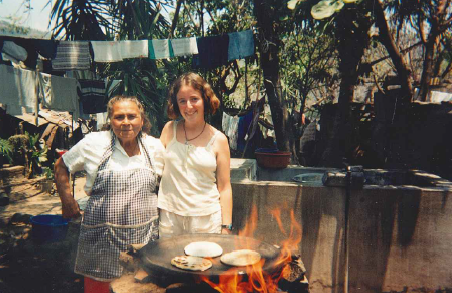
by Deb Kitzmiller, Brattleboro District’s Maternal and Child Health Coordinator for the Vermont Department of Health
Twenty years ago, in the Peace Corps in El Salvador, I was taught a life lesson that proved so valuable that I’m still reflecting on it within my work today. In 1999, Brattleboro based SIT/ World Learning taught me that in El Salvador the most important ingredient to a successful community development project is called confianza (in Spanish.) The word means trust- the kind that you get by being in a close relationship.
Salvadorans frequently see foreigners who swoop in and try to “fix” their problems in ways that are unsustainable. For that reason, they could be resistant to ideas brought in by foreigners, and confianza could be hard-won. Because Peace Corps volunteers actually live in the communities that they work with, there is plenty of time to build relationships, and therefore, the confianza required for working well together. We were actually told during training to spend at least three months doing no work at all except for getting to know people. This step of building confianza through relationship was that important– a critical step before proceeding together on project work. This concept has recently been popularized by Steven M.R. Covey who writes, “Change happens at the speed of trust.”
What surprised me most about this lesson is how much it applied to my work in public health, in my very own community, even now. What I had previously thought was a truth specific to working within this Central American country is actually true here too. It’s not about interacting with foreign cultures at all; it is about sustainability, which is universal. In El Salvador the locals became used to foreigners “dropping in” and telling them how to change their lives for the better, and in many cases these projects did not succeed. Similarly, in our own community we sometimes try to push through initiatives that weren’t formed with local input, and they have been the source of tension and lack of progress rather than achieving desired results. In addition, many of the young families that we work with have been let down by the systems and structures that people in positions like mine have helped set up. For that reason, I understand confianza as one of the most important parts of my job.
Taking the time to slow down and enjoy getting to know the people that I work with in my community is not just an added bonus to my job, it’s often what makes things work. For example, recently Brattleboro OB/GYN put together a postpartum planning packet with the help of the community. It wasn’t enough that we recognized that the postpartum experience is hard, and that our culture over-emphasizes birth planning as opposed to preparing for what happens after the birth. It also wasn’t enough that UVM’s Sandy Wood’s team had already put together a postpartum planning packet that inspired us.
It was our conversations with local individuals that had recently had babies telling us about their postpartum lives, helping us realize that the time for this action is ripe right now. It was the ease within which we were able to chat back and forth with Sandy Wood and the trust she had in our team to model our own version after UVM’s materials. It was also the easy relationship between our Perinatal Wellness Initiative (PWI)’s team members and Meghan Arthur, the nurse-midwife which allowed for the chatting back and forth, tweaking and personalizing the end product to be right for our community. Without the comfort and ease of frequent communications on all levels, a project like this one will become tedious have too many barriers to succeed. Our community created a beautiful product that will help our birthing families be better prepared for the postpartum period, and better able to access the resources they will need to do so. This lays one of the first steppingstones for our families to become strong and resilient.
Sometimes it feels like progress is slow, and it is hard to measure our successes. It is easy to get discouraged by this type of work for that reason. I would encourage anyone in this headspace to take a step back and stop worrying about progress for a bit. Slow down, get to know people, and develop confianza with your community. You never know, you might just be planting seeds for the future.


